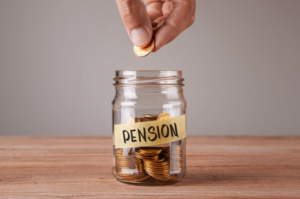 Most people hope to stop working at some point in life. Whether that is when you reach 55, 65, 75 or older will depend on your personal financial circumstances. Once the day comes you will need some kind of income to support you. For the majority of UK workers that will mean turning to their pension. The ideal scenario is that as soon as your salary stops, your private pension steps in to fill the void. However, that takes some forward planning. Pensions require decades of saving to build up into a suitable pot for a retirement income. Pensions can also seem complex and time-consuming. In this article we break down why you might need a pension and explain the pros and cons of investing in a pension. We also explore whether some of the most common alternatives will work for you.
Most people hope to stop working at some point in life. Whether that is when you reach 55, 65, 75 or older will depend on your personal financial circumstances. Once the day comes you will need some kind of income to support you. For the majority of UK workers that will mean turning to their pension. The ideal scenario is that as soon as your salary stops, your private pension steps in to fill the void. However, that takes some forward planning. Pensions require decades of saving to build up into a suitable pot for a retirement income. Pensions can also seem complex and time-consuming. In this article we break down why you might need a pension and explain the pros and cons of investing in a pension. We also explore whether some of the most common alternatives will work for you.
What is a pension?
A private pension is a long-term savings and investment plan. You contribute money over many years that can compound and grow until you are left with a pot large enough to see you through retirement. A pension can be organised by your employer, called a workplace pension, or by an individual, known as a personal pension. Both benefit from tax relief, as the government will top up your contributions.
Modern pensions are mostly defined contribution schemes, which means that your retirement benefits will be based on the value of your pension pot. However, some workers can still benefit from defined benefit schemes, which pay out based on your final salary and length of service. You can find out more in our article ‘What is a private pension?’.
The different types of pension
It is important to understand the differences between the two main categories of private pension. Your personal circumstances may mean that it is worth having one or both.
Workplace pension
A workplace pension is arranged by your employer to help save for your retirement. Most employees will be automatically enrolled in their employer’s pension scheme. Your contributions usually come straight out of your pay without you needing to do anything, with your employer also making contributions to your pot. You then get tax relief from the government to top up your savings. Alternatively, an employer may offer a salary sacrifice arrangement where you'll make pension contributions from your gross pay, reducing your taxable salary which could increase your take home pay. You’ll also benefit from lower National Insurance contributions as will your employer.
The key part of a workplace pension is the employer contributions. Most employers will have to make contributions to employee’s pensions, while others will scale up contributions as workers pay more money themselves. For example, your company may choose to match your pension contributions up to 5%. This means that you are effectively getting a salary boost, though you cannot spend the money until you retire.
Personal pension
A personal pension is opened by an individual. You pay in the money you want to save and the pension provider automatically adds on the government tax relief. If you are not a basic-rate taxpayer, you will need to claim the additional tax relief through a tax return. While you miss out on the employer contributions of a workplace pension, you can benefit from the increased flexibility and freedom of a personal pension. You do not need to pick between a workplace pension and a personal pension, find out if it might suit you to have both by reading our article ‘Can I have a personal pension and a workplace pension?’.
Head over to our ‘Best Pension in the UK’ page to find the best deals available for you.
State Pension
The State Pension is a benefit provided by the government, which most people will be able to claim once they reach a certain age. After you have reached State Pension age, you can claim State Pension payments until you die. The payments are usually made every four weeks and can form an income in your retirement. You qualify for the State Pension through making National Insurance Contributions (NICs), so you do not need to make extra payments like with a private pension. If you have gaps in your NIC record, you can make voluntary contributions to top it up. Read more in our article 'How to fill gaps in your National Insurance record to boost your state pension'.
However, the amount you receive is unlikely to be enough to meet all of your expenses in retirement – though that will depend on how much you spend each month. Most people will require a workplace or personal pension to meet the shortfall. You can see how much you may be able to claim by reading our article ‘How much is the UK State Pension?’.
The current State Pension age is 66 and due to rise to 67 by 2028. This is much older than the pension age of 55, which is the point at which you can access a private pension. This means that you could be working for significantly longer if you plan to rely solely on the State Pension. Read more about how the State Pension works in our article ‘Will I get a state pension?’.
Are pensions worth it?
The advantages of having a pension can be neatly split into two categories: the advantages over other means of saving for your retirement, and the advantages over not saving for your retirement at all.
Do you need to save for your retirement?
If you do not save for your retirement at all, you may still be eligible for the State Pension or other government benefits. However, the payments may not be enough to meet your expenses or give you a good quality of life. You may also need to work for much longer than you had planned to. Saving for retirement is an important part of planning for the future, so it is not something you should ignore. If you are saving for retirement, the obvious option is to pay into a pension.
Why should you save using a pension?
The tax relief offered by a pension can be a huge boost to your retirement savings. Though you may hear ISAs referred to as tax-free, it is the withdrawals that are tax free; savings are not topped up by government tax relief. A Lifetime ISA (LISA) is the exception, however, as the savings are topped up by the government, but in a different way to a pension. To read more about Lifetiem ISAs, read our article 'Lifetime ISAs explained'.
If you think that investing your money in stocks and shares is a better way to save for your retirement than putting money in your pension, but are concerned about losing the tax-relief benefits, you can have the best of both worlds. With a self-invested personal pension (SIPP), you can choose where to invest your money and what type of investment you want to finance. This could mean only investing in bonds, only investing in shares, or choosing a ready-made portfolio that matches your ethical standards. You could even invest in commercial property using a SIPP. This could be a great alternative if you are keen to invest in property but still want to benefit from pension tax relief.
The simplest way to boost your pension savings if your are employed is by maximising your workplace pension. Not saving into your workplace pension could mean you are missing out on extra money from your employer. Many workers will qualify for employer contributions, which means the company you work for will need to pay money into your pension on top of your usual salary. If you need more information, read our article ‘How do private pensions work?’.
Pension tax relief
Any money you pay into your pension pot will automatically get a 20% top up from the government. This also applies to money that is taken directly from your salary and paid into your workplace pension. An exception to this is a salary sacrifice arrangement that we mentioned earlier in this article. If you are not a basic-rate taxpayer, you can claim extra tax relief by filling out a tax return.
The percentage of tax relief applies to your pre-tax earnings. This means that a £100 contribution will be topped up by £25. This is because the top up is calculated from the amount you earn before tax is deducted, in this case £125 not £100. In addition to this, 25% of your total pension pot can be withdrawn tax-free when you reach retirement age.
The disadvantages of a pension
The most significant disadvantage of a pension is access. You will need to be at the pension age to withdraw your pension, which is 55 at the time of writing. However, the government has announced plans to raise the minimum pension age to 57 from 2028. It will then be fixed at 10 years below the state pension age. A pension is designed to help you save for retirement, so it should be no surprise that you will need to be a certain age to access your money.
It is technically possible to access your pension when you are younger, but in most cases there will be a significant penalty. For example, if you run into financial difficulty and need to withdraw your pension savings before you are 55, you will have to pay a 55% rate of income tax. You will likely also need to pay a company an additional percentage to complete the withdrawal for you. It is worth bearing in mind that many other savings and investment products include withdrawal restrictions too, though usually not as severe as with a pension. You can read more about withdrawing your pension in our article ‘Can I withdraw my pension?’.
Another important disadvantage is one that applies to all investments – there is risk involved. Your money can go up, but it can also go down. The danger of losing money is balanced by the bonus offered through tax relief, which you cannot get through other types of savings or investment products. You can also adjust the risk depending on what stage of your working life you are at. For example, you could move your investments to less risky options as you approach retirement age.
Alternatives to investing in a pension
The main benefits of paying into a pension relate to the tax relief advantages. Therefore, the best savings option to compare a pension to would be an ISA, as they also have tax-related benefits. For more information on how they compare, check out our article 'Pension vs ISA - which is the better investment?'. Alternatively, if you are between 18 and 40, you may want to consider the pros and cons of investing in a Lifetime ISA and how it compares to a standard pension. Read more in our article 'Pension vs Lifetime ISA - which is the better option for investment?'.
Some people may prefer instead to invest in property rather than contributing to a personal pension. While investing in property has the potential to be lucrative, it does come with significant drawbacks.
Is it worth getting a pension?
The answer for most savers is an emphatic yes. For many people, relying on the State Pension will mean working for much longer than they want to or are able to, as well as requiring them to cut their living expenses. Saving for your retirement through investments or traditional savings accounts means missing out on valuable tax relief and other pension advantages. It does not protect your money from your own spending habits or other financial emergencies. In addition, not paying or enrolling into your workplace pension can mean you are turning down additional money from your employer’s contributions.
You may find that other forms of investment or saving are a valuable part of your retirement pot, but they are unlikely to mean you do not need a pension. Read our article ‘Best Pension in the UK’ to see what options are available for you.





